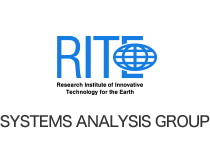Model Comparison International Collaborative Project for Changes in Energy Demand Induced by Technological Innovation」 (2019 - Present) alias EDITS
EDITS (Energy Demand changes Induced by Technological and Social innovations)
The aim is to induce social change by identifying opportunities for realizing a low-energy-demand society and presenting them as concrete and quantitative scenarios. In addition to conducting a comprehensive analysis of CO2 emissions reductions and changes in energy demand brought about by technological innovation, we also provide input to IPCC and other reports while conducting comparative research with major overseas research institutes.
The EDITS network brings together experts of various disciplines to regularly discuss and engage in multi-faceted energy demand research. The EDITS community works together based on the common interest in interlinked topics, transferring methodological knowledge, and exploring modeling innovations across demand-side models.
Goals and Overview
The EDITS business has the following three main goals.
- 1) Build an international research community with a focus on the energy demand side. Share the latest data, concepts, methodologies, and policy analysis on the energy demand side. Through these, deepen research and policy analysis discussions and promote mutual enrichment.
- 2) Develop state-of-the-art demand models for environmental and climate policy analysis through international comparison of methodologies and models. Furthermore, progress in concepts and methods across academic, energy, and environmental fields and expand them internationally.
- 3) Make better policy recommendations through structured model experiments and simulations. Building and leveraging models to deal with new sectors and service delivery, especially digitalization, the sharing economy, and policy-making that synergize in integrating the SDGs and climate goals to address the potential impacts and barriers of demand-side policies. Moreover, evaluate synergies and trade-offs with other SDGs goals.
In addition, we have established working groups (WGs) based on the following themes and conduct research with IIASA. It also holds a meeting quarterly and one annual conference. Participants are researchers registered as EDITS members, including many IPCC authors.
- WG1-Industry
[Theme] Comparing industry sector models (understanding differences in theory, geographic/temporal/biophysical coverage, data availability, methodologies, etc.), material efficiency effects, etc. - WG1-Buildings
[Theme] Comparison between building sector models (regional differences, heterogeneity), effects of sharing economy, impact of smart working on commercial building sector, etc. - WG1-Transport
[Theme] Comparison of transport sector models (activity type (passenger/cargo), location (urban/non-urban), vehicle size, mode differences, etc. - WG2-Data
[Theme] Collection and sharing of demand-side micro data - WG3-Narratives
[Theme] Building qualitative scenarios for low energy and material demand in line with the 1.5°C target and SDGs targets - WG3-Protocol
[Theme] Conducting comparative analysis between models (model analysis comparison utilizing the characteristics of each model) - WG3-Synthesis
[Theme] Development of evaluation framework in line with qualitative scenarios (welfare and feasibility evaluation), etc.
Cross-sectoral themes focus especially on digitalization, equity, lifestyle/behavior change, business models, and theory building. - WG4-Wellbeing
WG4-Wellbeing was formed in April 2023
The EDITS project is pursuing the above themes based on the participation of researchers in many specialized fields from many countries and regions, as shown in Table 1 because the energy demand side spans various sectors and varies from country to country.
In the EDITS project, we will contribute to the next IPCC report and provide research results that will lead to the promotion of energy demand side measures by governments and companies of each country. Energy demand-side measures, which EDITS considers to be the main target, are not directly reducing energy and CO2 emissions but are indirectly reducing energy and CO2 emissions through changing and optimizing products induced by advances in digital technology and so forth.
For this reason, it is difficult for the government and society to understand directly, and there is a possibility that the response will be delayed. Therefore, in this project, we will make the complex system into a form that is easy to understand and that can be seen quantitatively and disseminated to the government, companies, and society.
| Asian Institute of Technology (AIT) | Thailand |
| Central European University (CEU) | Hungary |
| École polytechnique fédérale de Lausanne (EPFL) | Switzerland |
| Fondazione Centro Euro-Mediterraneo sui Cambiamenti Climatici (CMCC) | Italy |
| International Institute for Applied Systems Analysis (IIASA) | Austria |
| International Transport Forum-Organisation for Economic Co-operation and Development (ITF-OECD) | France |
| Iscte - University Institute of Lisbon | Portugal |
| Lawrence Berkeley National Labs (LBNL) | USA |
| Osaka University | Japan |
| OpenEXP | France |
| Stanford University | USA |
| Tsinghua University | China |
| Universidade Federal Do Rio De Janeiro (UFRJ) | Brazil |
| University of California, Santa Barbara (UCSB) | USA |
| University of Groningen | Netherlands |
| University of Natural Resources & Life Sciences, Vienna (BOKU) | Austria |
| University of Oxford | UK |
| University of Plymouth | UK |
| University of Tokyo | Japan |
| University of Wisconsin | USA |
| Utrecht University | Netherlands |
| Yonsei University | South Korea |

